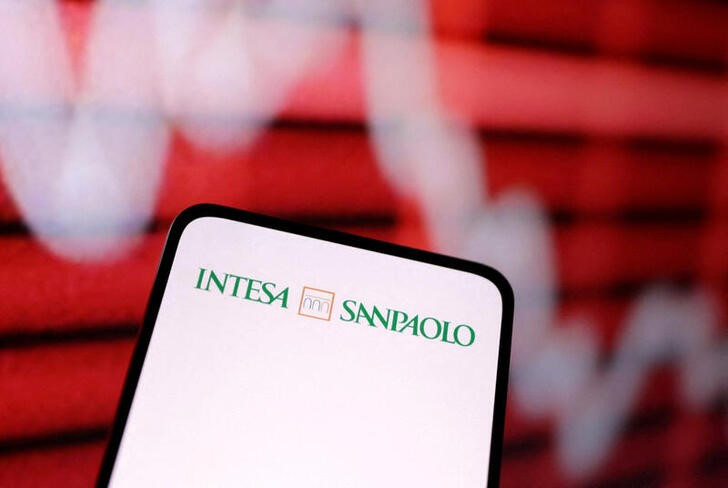By Angelo Amante, Valentina Za and Giuseppe Fonte
ROME (Reuters) -Italy dealt a surprise blow to its banks and sent shockwaves across the sector in Europe by setting a one-off 40% tax on profits reaped from higher interest rates, after reprimanding lenders for failing to reward deposits.
Sharply higher official interest rates have yielded record profits for banks, as the cost of loans soared while lenders held off paying more on deposits.
Countries such as Spain and Hungary have already imposed windfall taxes on the sector and others may now follow suit.
Italian Prime Minister Giorgia Meloni's government had floated the idea earlier in the year, but appeared to have cooled on the plan.
A senior banking executive told Reuters that lenders had been ready for "the chopping block, but then the axe didn't come down".
Since then, however, bumper first-half results from banks brought the issue back into focus and prompted the government to act on the eve of the summer political shutdown.
One government source said the move came as a surprise even to some ministers at Monday night's cabinet meeting. A second source made clear the government intended "to punish banks' unfair behaviour".
Lenders in Italy have passed on to depositors on average 12% of the rise in rates, versus 22% in the euro area, Jefferies calculated.
"One has only to look at banks' first-half profits ... to realise that we are not talking about a few millions, but ... of billions," Deputy Prime Minister Matteo Salvini told a news conference in Rome late on Monday.
"If (it is true that) the burden deriving from the cost of money has ... doubled for households and businesses, what current account holders receive has certainly not doubled," Salvini said.
Italy's banking share index had plunged 7.3% by 1515 GMT on Tuesday, with sector leader Intesa Sanpaolo (OTC:ISNPY) down 8.6% and rival UniCredit down 5.8%. Italian banks dragged the European index down 3.7%, with a Moody's (NYSE:MCO) downgrade of some U.S. banks also weighing.
Italian banks are up 50% over the past year, outperforming a 20% European sector rise.
The government wants to use the proceeds to help those struggling with the cost of living, such as mortgage holders.
WINDFALL FOR THE TREASURY
Citi analysts calculated the tax could wipe up to 12% off Italian banks' 2023 earnings. Bank of America (NYSE:BAC) estimated proceeds of between 2-3 billion euros for the government.
Sources said the Treasury expected to collect less than 3 billion euros ($3.3 billion) from the measure.
That would be similar to the 2.8 billion euros raised by this year's windfall tax on energy companies.
Italy will apply the tax only in 2023, with banks paying the sums by June 30, 2024. The measure applies to the net interest margin (NIM), a measure of income deriving from the gap between lending and deposit rates.
Italy will tax 40% of the NIM earned in 2022 or 2023 - depending on which sum is bigger - targeting the yearly increase above thresholds set at no less than 5% for 2022 and 10% for 2023. Under an early draft, the thresholds were 3% and 6%.
Intesa at the end of last month said it expected to pocket more than 13.5 billion euros this year from its NIM alone.
All main Italian lenders reported much stronger than expected results for the first six months and upgraded their profit outlook thanks to higher rates.
Unlike peers in some other European countries, Italian banks never charged for deposits when official rates fell below zero.

Since rates rose, they have cut current account costs but have refused to reward cash held there saying that money is for day-by-day use and not an investment.
($1 = 0.9112 euros)